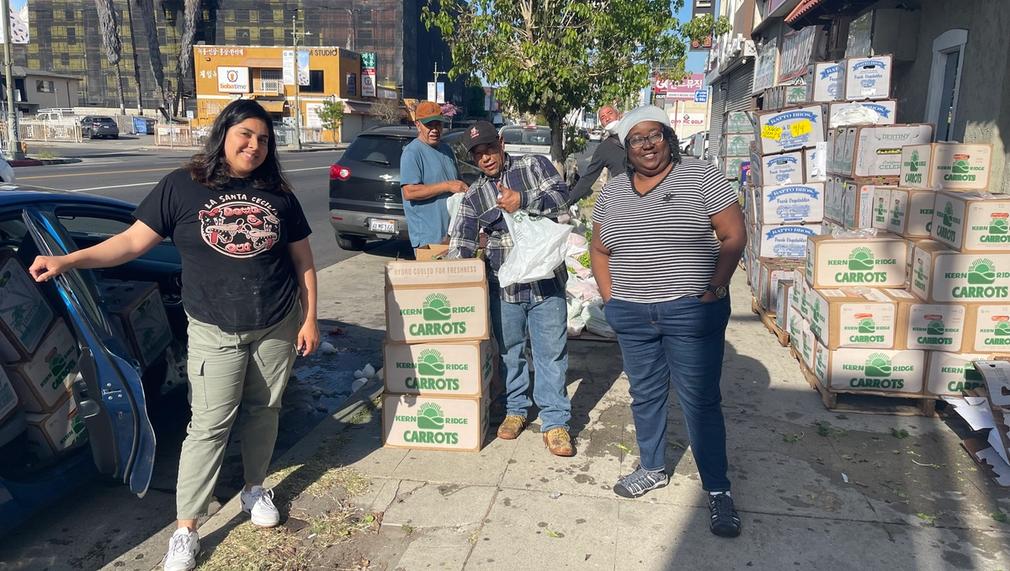Food is Medicine
Our Food is Medicine initiative will expand access to high quaity, culturally appropriate foods to 10000 plus families in Los Angeles by utlizing existing and emerging food aid programs. Our Community Health Worker certified staff will also assist with increasing access to basic essentials. Our in house chef and culinary instructor will educate people on healthy, nutritious, and delicious food preparation. Our collaborator, Hunger Action LA, will expand their door to door produce and prepared meal distribution.

What is the primary issue area that your application will impact?
Food insecurity and access to basic needs
In what stage of innovation is this project, program, or initiative?
Expand existing project, program, or initiative (expanding and continuing ongoing, successful work)
What is your understanding of the issue that you are seeking to address?
1 in 4 LA residents are food insecure. The reasons behind food insecurity include poverty, unemployment, underemployement, lack of affordable housing, and chronic health issues. We recognize food, shelter, and utilites as three core essential needs. When we increase access to free or low cost food, we help a person free up a portion of their food budget to pay for their other basic needs or essentials. Food insecurity has many negative impacts to health, resiliance, job security, and education attainment. When people don't have enough food it leads to myriad of issues such as inability to concentrate at school or work. Difficulty concentrating at school or work. Food insecurity deprives people of nutrients and contributes to obesity (consuming very high calorie foods that are cheap), diabetes, and other chronic diseases. We also recgonize that LA and California has an abundance or excess of food that can be more equitably distributed.
Describe the project, program, or initiative this grant will support to address the issue.
Since our founding in February of 2020 at the onset of pandemic, we have been at the forefront of changing food distribution programs by 1) Demanding high quality, culturally appropriate foods and produce; 2) Demanding food and produce distribution be done in multiple languages beyond English and Spanish; 3) Demanding elegibility for WIC and Food Stamps for undocumented people; and 4) Being lead organizers to implement when our demands were met. We have also been advocating for “Food as Medicine” for years. “Food is Medicine” recognizes the importance of culturally appropriate and nutritious foods as a part of preventive health care and as part of a health care plan. The Federal, State, and local governments; and foundations have recognized our demands. Now we're preparing to implement our "Food is Medicine" initiative by connecting more low income, marginalized, or isolated people to Medically Tailored Meals (MTM) that are available for free with a prescription from a Registered Dietitian. The produce or meals can be picked up or delivered at no cost. This grant would support the additional staff and supplies required for our Food is Medicine initiative. It would help us expand access to MTMs to linguistically marginalized people and to people who do not speak English. It would help expand access to Native American/Indigenous peoples, Asian American Pacific Islander Native Hawaiians, Black immigrants and migrants (including refugees from the South).
Describe how Los Angeles County will be different if your work is successful.
We believe in a world where nobody is food insecure, especially in a county like Los Angeles that has food abundance and excessive waste. Too many Angelenos are left out of food security and health equity programs because of language barriers and culturally irrelevant solutions. We intend to dramatically reduce such barriers. Our Food is Medicine initiative will empower people to co-create their own nutrition programs by letting recipients choose their culturally preferred foods in their preferred languages. Our Food is Medicine initiative will serve as a gateway to additional food aid programs such as free coupons and vouchers to use at Farmers Markets to purchase produce. Our multilingual and multilingual Community Health Workers intend to meaningfully connect constituents to a range of food and health related services; and essentials. We intend to train local leaders as Community Health Workers so that they can be leaders and advocates in their cultural and linguistic communities.
What evidence do you have that this project, program, or initiative is or will be successful, and how will you define and measure success?
Food is Medicine is a new initiative that nests well with our existing food security programs and distribution. We define and measure success based on the number of new recipients we meaningfully connect with Food is Medicine and Medically Tailored meals AND surveys that we will conduct AND the increase in diversity of languages and food cultures we serve. Food is Medicine has been researched by the Federal, State, and local governments, as well as foundations. Kaiser Permanente, America's largest health care company, is committed to "Food is Medicine" and launched their "Food is Medicine Center of Excellence" earlier this year. We have recently begun a partnership with Kaiser to expand their "Food is Medicine" programming in Los Angeles County. Our long term goals are to increase access to a range of food benefits, social and human services, and health care by eliminating language, cultural, and environmental barriers to access.
Describe the role of collaborating organizations on this project.
Hunger Action LA will deliver food and produce 1250 times at a cost of $6 per delivery at a total cost of $7500
Approximately how many people will be impacted by this project, program, or initiative?
Direct Impact: 10,000.0
Indirect Impact: 30,000.0